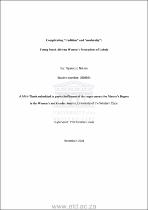Complicating “tradition” and “modernity”: Young South African Women‟s Perceptions of Lobola
Abstract
An indigenous cultural practice among the many ethnic groups of South Africa, lobola has changed immensely, especially in highly urbanised towns. It has also been the subject of several interpretations in academia, the media, and popular opinion. These have included ethnographic scholarship that focuses on its cultural significance and its centrality to reciprocal relationships between groups. Other academic and activist views criticize how lobola, as a form of bride wealth, instrumentalises women in patriarchal society. In addition, other interpretive strand acknowledges lobola's patriarchal impacts while also recognizing the agencies and choices of women who embrace it. The work demonstrates that women are neither consistent agents nor constant victims of lobola, but that they experience it in different ways. As a result, the study explores how young women‘s situated knowledge helps us understand lobola‘s complex and ambiguous meanings that might assist in comprehending the current connotations of lobola, which are presently complicated and confusing. The current study is concerned with mapping out and analysing the complexities of standpoint knowledge-making that is typically side-lined in the numerous scholarly and activist studies of lobola by selecting a diverse range of young women respondents as well as commentators in the public sphere.

